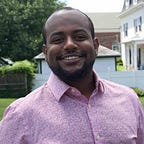Confronting White Spaces
I work in Mental Health in a predominantly white institution. This is the email that I sent to my colleagues to get a discussion started. Sending this email was not easy, but we should all confront our white-dominated spaces and fight for racial justice, especially if you are in healthcare. I hope reading my email gives you the courage to start your own discussion.
“Hi friends and colleagues,
I hope this email finds you safe and well. I am writing to you in light of the global pandemic that has been disproportionality affecting Africans Americans and the national pandemic of police brutality and racism that has waged war against black bodies and has taken the lives of Tony McDade, David McAtee, James Scurlock, Breonna Taylor, Sean Reed, Ahmaud Arbery, and George Floyd — to name the most recent victims. Unfortunately, but unsurprisingly, this list continues to grow daily.
I’m not going to sugar coat anything. I’m hurting. Mentally, physically, emotionally, and spiritually. I’m hurting and I am exhausted. I keep imagining myself as the next dead black man. I can already see the hashtags. What’s the point of working hard to become a doctor if I’m going to die a victim of police brutality? Does my life even have any value? I’m hurting and my brothers and sisters are hurting.
Why am I being so vulnerable and telling you all of these things? I want you to understand just how much of an impact this is having on the lives and mental health of black bodies.
Racism is a social determinant of health that has a profound impact on the health status of children, adolescents, emerging adults, and their families. Not only does this trauma affect our mental health but it leads to transgenerational consequences that impact the health of our children even before they personally experience racism (through epigenetic changes in our DNA).
As mental health professionals, we have to realize that we are at the frontlines of two pandemics.
If racism is a social determinant of health, then it is our job to be anti-racist. It is our job to combat racism and fight for racial justice. If not, because it’s the right thing to do, we have to do it for our patients. I don’t want to get political but silence in itself is a political statement. This is why I write to you today. I am using my privilege as a cis-gendered educated black man in a white-dominated space to talk about the issues of police brutality and racism. We should all assess our privileges and see how we can advocate for the health and safety of marginalized identities.
Check on your black friends, we are NOT alright. Support us! I implore all of you to go out to a peaceful protest (they are peaceful until curfew (9 pm), that’s when the police and military start aggressing citizens), sign petitions, donate to bail funds, educate your friends and family members, get connected to a local organization serving these communities, confront racism when you see it, share links/resources, and organize! Please don’t be silent/complicit in these murders.
If you don’t know how to get started, here is a resource.
I’ve noticed that we’ve had more black patients on the unit recently. I am bringing up this observation because I want these patients to get culturally competent care while they are here at McLean. Realize just how much of a toll all of the current events are having on them. Please do not give them colorblind care. Race is a big part of identity, identity is a big part of life experiences, and life experiences have the potential to impact our mental health. It may be awkward to talk about these things as non-POC (person of color) but please bring these things up. It is a disservice to black patients to neglect to bring up how these things are impacting their mental health on a daily, especially now. Be bold and courageous!
Please reach out if you would like to talk about ways of being culturally appropriate. I am in the early stages of collaborating with the hospital to create a curriculum for cultural competency with regards to COVID and the murder of black people by police, but I would be more than happy to field any questions if anyone wants to discuss these matters in the meantime.
With respect to COVID, I am currently involved in volunteer efforts with organizations catering to these communities and I need your help! Can you advertise this list of volunteering opportunities so that other members of our community can be aware of it? (Remote volunteering opportunities available!) Please add more volunteer opportunities if you know of any organizations helping underserved communities in Boston during COVID.
https://docs.google.com/spreadsheets/d/1CQLI2RmO5vV8JieAphvxNyDXh6AF-CDQRocVqJioEhs/edit#gid=0
I am also collecting the contact information of interested volunteers. I plan on sending weekly emails to alert people to existing opportunities. Can you also advertise this link so I can establish a database of volunteers?
https://docs.google.com/forms/d/1c7YSciSJTSCr-4QsUWAb584hHaIwDMBW_B5FXbvg0W8/edit
My goal is to reach out to non-profit organizations operating in Boston so that I can find out what they are doing in response to COVID and learn how we can support them. This should increase the number of volunteer opportunities on the google sheet.
The culture of mental health and history will be defined by how we choose to act. What will you do?
The mental health of black people matters.
Black lives matter.”
